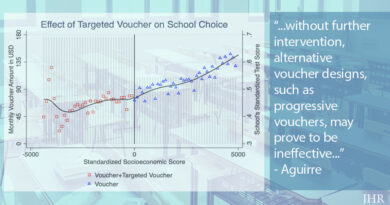Too many low-income college students don’t graduate, but a program that aims to address all challenges can help
One decade after high school completion, only 14 percent of low-income students in the United States have attained a bachelor’s degree, compared to 60 percent or more of their higher income peers. This stark difference is driven by gaps in both college access and college success, and it’s not explained away by differences in academic readiness for college. Recent research by Lindsay C. Page, Stacy S. Kehoe, Benjamin L. Castleman, and Gumilang Sahadewo examines how one “comprehensive support” program aims to make a difference.
Many efforts to improve college completion among low-income students focus on a single barrier to postsecondary success, such as affordability. Page and her colleagues investigated the Dell Scholars Program, which supports low-income, primarily first-generation college-goers more comprehensively by providing both scholarship aid and ongoing, proactive support. The goal is “to address all of the emotional, lifestyle, and financial challenges that may prevent” college completion. Students complete regular check-ins via a web-based portal, and staff follow up with students to help them address red-flag situations that may be detrimental to their ongoing studies.
Relying on strict cut-offs in the selection of Dell Scholars, the researchers were able to compare the selected students to peers with similar academic, demographic, and socioeconomic characteristics. The team found that the program meaningfully improves college performance, persistence, and success for the students selected as Dell Scholars—participants were 6 to 10 percentage points more likely to earn a bachelor’s degree within four years and 13 to 16 percentage points more likely to do so within six years.
Could more low-income student have access to a Dell Scholars-type support system? Page sees some options: “Although it serves only a few thousand students at any given time, the operation of the Dell Scholars Program makes it a potential model for efficiently improving the effectiveness of investments already being made to increase college success for low-income and first-generation college-goers throughout the country. What makes the program costly is that each Dell Scholar is provided $20,000 in scholarship funds, on par with other scholarship efforts. Beyond this funding, the program is strategic in targeting followup support most intensively to students only when the data suggests they need it. Therefore, the program staff are able to provide ongoing tracking and support when needed with only a small team of program staff.”
Read the full study in the Journal of Human Resources: “More than Dollars for Scholars: The Impact of the Dell Scholars Program on College Access, Persistence, and Degree Attainment,” by Lindsay C. Page, Stacy S. Kehoe, Benjamin L. Castleman, and Gumilang Sahadewo.
***
Lindsay C. Page is an assistant professor of research methodology at the University of Pittsburgh (lpage@pitt.edu, @linzcpage). Stacy S. Kehoe is associate program officer at the Bill & Melinda Gates Foundation (Stacy.Kehoe@gatesfoundation.org, @stacysongkehoe). Benjamin L. Castleman is an assistant professor of education and public policy at the University of Virginia (castleman@virginia.edu; @BenCastleman). Gumilang Sahadewo is an instructor of economics and business at Universita Gadjah Mada (gasahadewo@ugm.ac.id; @gasahadewo).
The authors acknowledge the Dell Scholars Program within the Michael and Susan Dell Foundation for providing financial support to make this research possible. The interpretations and views presented here do not reflect those of either the Dell Scholars Program or the Michael and Susan Dell Foundation.



